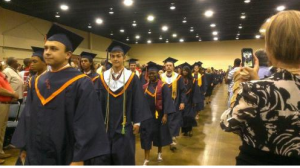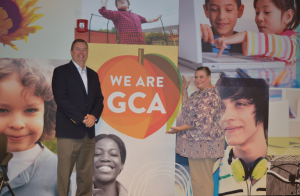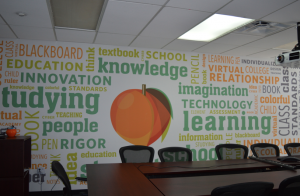
Georgia Cyber Academy begins the school year with a new Head of School and a significant number of changes. The changes come as Georgia Cyber Academy seeks renewal from the State Charter Schools Commission in 2019. School leaders say half of the more than 12,000 students who attend the school are being served well. But changes are being made to improve academic results for all students.

L to R: Mike Kooi, GCA Executive Director, and Angela Lassetter, GCA Head of School
New Head of School Angela Lassetter wants everyone to know the benefits and potential of virtual education. She says Georgia Cyber Academy is a wonderful fit for gifted students, children who are homebound due to illness, students with special needs, athletes who compete nationally, families who travel internationally to give their children exposure to multicultural environments, and rural students who do not have access to higher-level curriculum.
The changes for the 2018-2019 school year include reducing class sizes and tightening school attendance and engagement policies. The school has also temporarily capped enrollment as it works to improve quality. Under the new classroom engagement policy, students will have to earn flexibility. For instance, an “A” student who performs well in their classes and on state tests, would likely be given full flexibility, which would allow them to attend classes on their own schedule and pace. The student could also decide to a greater degree if their classes were live or taped. Meanwhile, a student who comes to Georgia Cyber Academy and is several grade levels behind in one or more subjects would have to adhere to a more traditional school schedule with more live classes. School leaders say as students show improved academic performance, they will be given additional flexibility.
“Flexibility does not mean you get to decide whether you’re going to do work to improve. That’s not  optional. We get to define that as the educational institution,” says Lassetter. “Flexibility in the virtual sense means you get to do it at home, you get to do it in your pajamas, you get have additional lessons if your parents want something else taught, they define your peer group. That is the flexibility that is inherent to you attending a virtual school. Actual flexibility for how you attend school and go forward that’s the purview of your level of performance, and it should be monitored consistently.”
optional. We get to define that as the educational institution,” says Lassetter. “Flexibility in the virtual sense means you get to do it at home, you get to do it in your pajamas, you get have additional lessons if your parents want something else taught, they define your peer group. That is the flexibility that is inherent to you attending a virtual school. Actual flexibility for how you attend school and go forward that’s the purview of your level of performance, and it should be monitored consistently.”
The school also plans to hold parents more accountable for student attendance.
“If you’re not attending a brick and mortar class you are truant. We need to treat it the same way if you’re not attending your virtual classes,” says Mike Kooi, Executive Director of Georgia Cyber Academy. “We do have flexibility, but that has to be earned.”
Georgia Cyber Academy has been reducing class sizes for the past few years, but this year’s teacher to student ratios are approximately half of what they have been in some past years. Kooi hopes giving teachers smaller classes will allow them to give students more individualized attention and reduce the amount of administrative work they have so they can better serve children. Teachers will also be provided with instructional coaching to help support them and improve their skills in the classroom.
In addition to relationships with teachers, the school is also increasing the number of individuals in its Family Academic Support Team (FAST). In the past, struggling students were referred to FAST. Starting this school year, every family enrolled in Georgia Cyber Academy will have a member of FAST team act as a family liaison. The liaison will work with families from the time their children first enroll until they graduate. The liaisons will check in with families and help them interface with counselors, special education providers and teachers if necessary. Kooi and Lassetter say adding more FAST team members is intended to provide an additional touch point for families, which is important in a virtual environment.
Georgia Cyber Academy’s board in conjunction with curriculum provider K12 and the State Charter Schools Commission drove the sweeping changes made this year. Kooi and Lassetter say the State Charter Schools Commission has been especially helpful as they worked to make the major modifications.
“The staff of the SCSC has been extremely supportive and collaborative in working with us,” said Lassetter. “They are really excited to see the possibilities now that we are trying to find what that is that will make this work.”
Georgia Cyber Academy initially operated under another brick-and-mortar school’s charter before acquiring its own charter. Lassetter says for the last four years the school’s board has worked to figure out what oversight of a virtual environment looks like, because nobody had written a rulebook. She says what works for a brick-and-mortar governing board does not work for virtual schools. She said the board had to figure out how to monitor the school, build dashboards that did not previously exist, figure out where data can be collected, and learn where to put interventions in place. Lassetter says the task was especially challenging because the school serves students in all of Georgia’s 159 counties.
“In a virtual environment, we can let a seventh grader take calculus, and there is not a problem. I don’t think we’ve done that in the past. We’ve always been cautious. We’ve taken those mindsets and habits from the traditional environment and translated them into the virtual environment,” said Lassetter. “Why are we not allowing those gifted students to progress fully? We can give AP classes to students in rural Georgia who wouldn’t have access to them in a brick and mortar setting. We have dual enrollment available because we have partnerships with 30 technical colleges and universities, so they can do that online.”